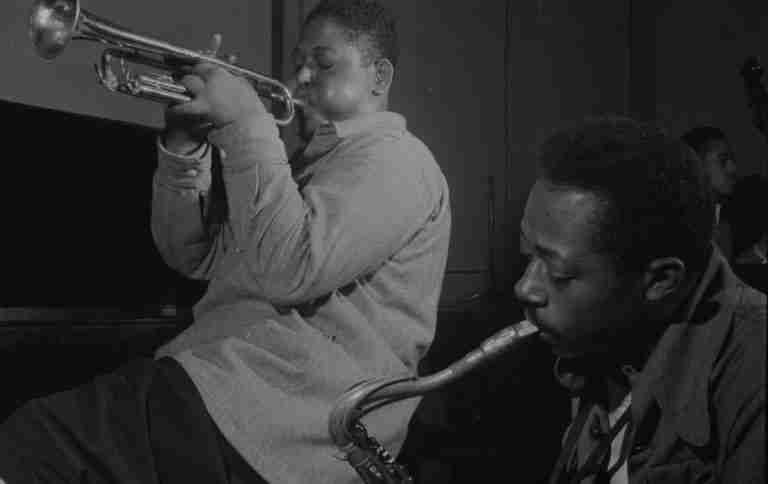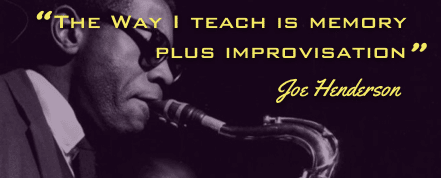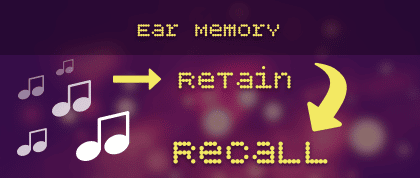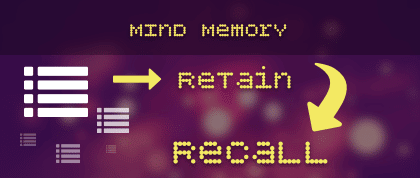What is a jazz musician’s most important tool? Is it their ear? Their technique? The concepts at their disposal? All of these are extremely important, but without this one specific tool, they’re all useless…
The jazz musician’s most important tool is their memory.
Harold Mabern used to drive this point home to us all the time.
Think about it.
You can have the best ear in the world, name any sound you hear, transcribe a progression with ease…
But if you can’t retain the information you’re learning in your mind and recall it for instantaneous use later, it’s not going to help you be a better improviser.
You can’t go on stage with a book of the things you know, the lines, the tunes, the concepts…everything has to be in your mind.
And really, that’s the only stuff you actually know.
Joe Henderson took this to the extreme in his teaching style.
In general, Joe didn’t allow the student to record the lesson or write down anything on staff paper. Everything had to be memorized right away.
So what exactly does a having a great memory in terms of playing jazz music mean?
And, how can we best develop this talent?
How to use your memory in jazz
In terms of jazz improvisation, memory means two things
- memorizing things with your ear
- memorizing things with your mind
Yes, technically memorizing something with your ear still is in your mind, but nevertheless, we’ll refer to this as the “ear part”…
There’s the ear part and the mind part.
The ear part
Ear-memory has to do with how well you can retain and recall information that you hear.
Why is this such an important skill?
As a jazz musician we have to have tunes, lines, concepts, intros, outros, interludes, harmonies and more stored in our memory ready to be used at any moment.
Memorizing these things by looking at written music, using our eye, does not create a vivid enough memory for us to then access that information with ease in the future.
By using our ear-memory to store aural information, it naturally creates a memory which can easily be retained and recalled.
To understand what I mean by “retain-and-recall” think of your ear as a tape recorder. You listen to something, you can then store it and replay it over and over.
Now what matters is how well you can do this.
To what degree can you do the following?
- Listen to a jazz soloist play a line, then hear the line in your mind and replay it in your mind
- Listen to chord changes and replay them in your mind
- Listen to a chorus of a solo or a whole solo, hear the solo in your mind and replay it in your mind
The ear-memory part all goes back to how well you can retain large chunks of music after hearing them once or a few times.
Obviously the fewer times you hear the selection and the longer the selection is, the better your musical memory is.
Then, there are some extra skills to your ear-memory that have to do with how well you can manipulate the information in your mind and how well you can recall the details.
Once you hear a selection of music, can you:
- Isolate the various instruments in your mind?
- Hear all the instruments clearly, not just the soloist or the instrument you play?
- Slow down the music in your mind?
These are all excellent skills to develop, which we’ll get into later…
The mind part
Now, there’s this whole other part of musical memory that we’ll think of as mind-memory because it starts with the pure memorization of facts.
It has to do with things like this:
- What’s the tritone sub of C7
- What’s the ii chord if Ab7 is the V chord?
- What’s the #9 on Db7?
Having the structures memorized on a deep level helps you conceptualize and understand everything more easily and helps you learn more quickly.
The best way to imprint these structures in your mind is through the process of visualization, which our Visualization eBook goes over in detail.
And just as the ear-memory part crept over to the mind, the mind-memory part creeps over to the ear, because ideally you’re not just memorizing theory, but you know what it sounds like too—The Ear Training Method is a simple solution to this.
So you can see it’s all about your ability to retain information. And that information begins by being either ear related or mind related—it’s either a sound or group of sounds, or it’s typical chord patterns, chord tones or relationships you encounter over and over.
How to get a great musical memory: The basic idea
A good musical memory comes from a few things…
First, there’s the ear part. It comes from:
- Listening to music every day
- Transcribing by ear frequently
- Paying more attention to the music in your mind
And second, the mind part comes from:
- Memorizing and drilling common progressions
- Memorizing and drilling chord-tone relationships to chords
We constantly say transcribe, learn tunes straight from recordings, learn lines in all keys without writing them out.
What do all these things do?
They improve your musical memory.
You get a better musical memory by not taking shortcuts and forcing yourself to actually do the work.
The next time you hear something you like on a recording, listen to it over and over until you can replay it in your mind before you transcribe it.
Or the next time you’re taking a phrase through all keys in various root movements, rather than writing everything out do the whole process in your mind.
These things also explain why using transcription books and such are so detrimental to your progress. They’re not just doing the work for you to get a line or concept, but they also don’t allow you to get the constant ear-memory work you need to improve in this area.
Besides doing your own homework, let’s look at some specific exercises to help you improve your retention of information in your mind and ear.
How to get a great musical memory: Ear-memory exercises
Throughout these exercises you can use any music you want, but for our example, we’ll use Mile’s solo on Freddie Freeloader, starts around 2:12:
Ear Memory Exercise 1 – Quick retention
Try the exercise with this excerpt from the solo:
- Listen to a short line in a solo you like
- Stop the music. Replay the line in your mind
- Listen to the line again
- Stop the music. Replay the line in your mind again paying close attention to detail. Are you replaying just the soloist or the whole band? Can you clearly hear the pianist? The drummer? The bassist? You want to hear the whole band exactly as the if the music were playing.
- Repeat this process for 10-15 minutes aiming to hear the music more and more clearly and retain it in your mind.
Exercise 2 – Two line retention
Try the exercise with this excerpt from the solo:
- Listen to 2 lines in a row in a solo you like
- Stop the music. Replay the music in your mind exactly as you heard them
- Listen to the selection again
- Stop the music. Replay the music in your mind again paying close attention to detail. Are you hearing all the instruments? Are you hearing the rest between the two lines? Are you hearing how one line flows into the next? You want to hear the whole band exactly as the if the music were playing.
- Repeat this process for 10-15 minutes aiming to retain both phrases in your mind.
Exercise 3 – Three+ retention
Try the exercise with this excerpt from the solo:
In this exercise, do the same process as you did in the last two exercises, but push yourself to do a larger chunk of music, perhaps 8 bars, or even a full blues chorus. See how far you can push yourself.
Work on hearing in larger chunks. If you can accomplish the exercises with one line, there’s no reason you can’t learn how to do two, three, or even a whole solo!
Exercise 4 – Bass isolation and retention
In the Bass Isolation and Retention Exercise, you’ll simply go through the steps as before but try to isolate the bass in your mind and replay it.
The goal is to make it sound more like this in your mind:
Exercise 5 – Chord isolation retention
In the Chord Isolation and Retention Exercise, do exactly what you did in the previous exercise, but instead of isolating the bass, isolate the chording instrument.
Use this excerpt to try the exercise:
How to get a great musical memory: Mind-memory exercises
Ok, now that we’ve covered the ear-memory exercises, let’s look at some mind-memory exercises.
Remember, the primary goal of these is to memorize and drill common chord tone and chord progression relationships that you encounter over and over. The less you have to think about these, the more you can focus on creating music when you improvise.
The chord tone anywhere exercise (because you can do it anywhere)
- Think of any chord. How bout Ab7 for this example.
- Immediately name the 3rd of the chord (C)
- Repeat this for 10-15 minutes randomly choosing different chords
- Now, do this exercise with another chord tone, so think of any chord, and immediately name the 5th, 7th, #11 or whatever.
You can make up your own exercises…
For instance, if I’m on the subway and I have 20 minutes to kill, I might say I’m going to work on dominant chords.
I’ll think of a dominant chord and then immediately name the #9.
I’ll do this for a bit and then say…now I’ll immediately name the b9…
And then maybe I’ll name two chord tones in a row like #9 and b9…
To make these exercises effective, you must come up with your own exercises and push yourself!
Chord progression anywhere exercise
This exercise is the same as above, but uses chord progressions instead of chord tones.
- Think of any dominant chord. Let’s use Ab7 again.
- Immediately name the ii chord that would come before it (Eb minor)
- Repeat this for 10-15 minutes
And as before, this is just one example of what you can do. Make up your own variations of this exercise with other chords.
I can’t stress the process of visualization enough. It’s the key to attaining a working knowledge of all this information quickly.
Improving your musical memory
Your musical memory is your most important tool as a jazz improviser. Get in the habit of doing things that might take a little bit more work, but will help improve your memory.
This means transcribe a whole line, chorus, or solo by ear without writing it down as you go, forcing yourself to keep the music in your mind as you learn it.
Or when taking a line through all keys in while steps, minor thirds, major thirds or any other root movement, avoid writing it out and do all the transposition in your mind.
Make sure to do all the exercises we talked about with your own musical selection and have fun with it! See how well you can replay music in your mind, retaining, recalling, and isolating various parts.
And whenever you have a spare minute, you know how to fill it! The Chord Tone Anywhere and Chord Progression Anywhere exercises are with you wherever you go.
Make strengthening your musical memory a habit and a priority and you’ll find your entire musicianship moving to a higher level.




















